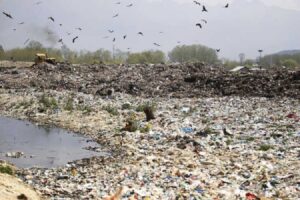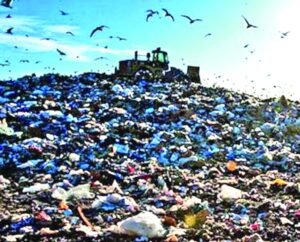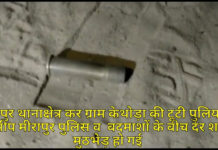Srinagar, the summer capital of Jammu and Kashmir, is renowned for its breathtaking landscapes, serene lakes, and lush gardens. However, in recent years, the city has been grappling with a less picturesque reality: the growing menace of unregulated garbage dumping. What was once a pristine paradise is now under threat from mounting piles of waste that not only mar its natural beauty but also pose serious health and environmental risks.

The Hazardous Nature of Garbage Dumping
Improper disposal of solid waste in Srinagar has become a major concern. With an ever-growing population, urban sprawl, and increased tourism, the amount of garbage generated has surged beyond the city’s waste management capacity. The most common types of waste include household refuse, plastic packaging, food scraps, construction debris, and even medical waste.

The consequences of indiscriminate dumping are alarming:
1. Health Risks: Open garbage dumps are breeding grounds for mosquitoes, rats, and other disease-carrying pests. Residents living near such sites are at increased risk of contracting diseases such as dengue, malaria, typhoid, and respiratory infections.
2. Water Pollution: Many dumping sites are located dangerously close to water bodies like the Anchar lake ,Dal Lake, the Jhelum River, and small streams. Leachate from waste seeps into the water, contaminating it and threatening both aquatic life and human consumption.
3. Air Pollution: Burning of waste, a common practice in some areas, releases toxic fumes into the air. This contributes to air pollution and exacerbates respiratory problems among the population, especially the elderly and children.
4. Soil Contamination: Hazardous chemicals from improperly dumped industrial and electronic waste can leach into the soil, degrading its quality and making it unfit for agriculture.
5. Impact on Tourism: Tourism is a vital part of Srinagar’s economy. Dirty streets, foul smells, and polluted lakes tarnish the city’s image and deter visitors.
How to Properly Manage and Dump Garbage
Tackling Srinagar’s garbage problem requires a multi-pronged approach involving the government, civil society, and every individual citizen. Here are some key strategies to adopt:
1. Segregation at Source: Waste should be separated at the household level into biodegradable (organic), non-biodegradable (plastic, glass), and hazardous (batteries, chemicals) categories. This makes recycling and disposal more efficient.
2. Recycling and Composting: Organic waste should be composted to produce fertilizer, reducing landfill load. Recyclables like paper, plastic, and metal should be collected separately and sent to recycling units.
3. Community Awareness: Public awareness campaigns are vital. Schools, colleges, and local organizations must educate people about the impact of improper waste disposal and encourage responsible behavior.
4. Efficient Collection and Transport: The local municipal corporation must ensure timely collection of waste and maintain clean, covered trucks to transport garbage to designated treatment facilities.
5. Modern Landfills and Waste-to-Energy Plants: Srinagar needs engineered landfills that are lined to prevent leakage and equipped with systems to capture methane gas. Establishing waste-to-energy plants can also help in converting garbage into electricity.
6. Ban on Single-Use Plastics: Strict enforcement of bans on polythene and single-use plastics will significantly reduce the volume of non-biodegradable waste.
7. Strict Regulations and Penalties: People and businesses that violate waste management laws should be penalized. Regular inspections and accountability are key to maintaining cleanliness.
Conclusion
Garbage dumping in Srinagar is not just an environmental issue; it is a public health crisis and a threat to the region’s economy and heritage. A clean Srinagar requires collective effort — from individuals segregating waste at home to authorities enforcing proper disposal methods. By adopting sustainable practices and raising awareness, we can restore the city’s glory and protect its environment for generations to come.
Let’s not let paradise be buried under piles of waste — act now for a cleaner, greener Srinagar.
Zahid khan /Senior journalist TRP News.















